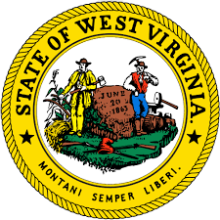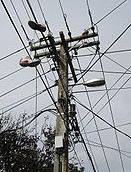
West Virginia rural communities struggle with access to broadband but a bill in the state legislature is taking some first steps to encourage better connectivity. HB 3093 passed the House with wide support (97 - 2) and has been sent on to the Senate for review. The bill doesn’t appropriate any funding for Internet infrastructure projects around the state, but adopts some policies that may help local communities obtain better connectivity.
Revenue Neutral And Popular
The state is facing a $500 million budget deficit and lawmakers don't have the appetite to appropriate finds for Internet infrastructure projects. As in most states, policy bills do well during times of financial strife. Elected officials still want to do what they can to encourage better broadband so, according to at least one lawmaker, the revenue neutral nature of the bill has contributed to its success in the legislature. Delegate Roger Henshaw, one of the bill's co-sponsors, told Metro News:
“Notice this is a revenue-neutral bill,” Hanshaw said. “That’s in fact one of the reasons we’re rolling it out now. We have other bills here in both the House and Senate that are not revenue-neutral bills that were on the table for consideration.
“But with the clock ticking on us, it became clear that we probably ought to be looking at options to advance service that didn’t even have the possibility of a financial impact. This bill does not.”
Check out the 3-minute interview with Hanshaw on Soundcloud.
The Broadband Enhancement Council
West Virginia’s Broadband Enhancement Council was created in a previous session and receives more authority and responsibility under HB 3093. They are tasked with the authority to, among other things, gather comparative data between actual and advertised speeds around the state, to advise and provide consultation services to project sponsors, and make the public know about facilities that offer community broadband access.
HB 3093 briefly addresses the creation of the “Broadband Enhancement Fund," and addresses how the funds should be spent. For now, the fund remains dry. The fund is under the control of the Secretary of the Department of Commerce. The Broadband Enhancement Council also has the authority to apply for and dispense funding from the state legislature and from federal sources.
Over the past several years, we’ve seen how a state agency, the Massachusetts Broadband Institute (MBI), has repeatedly shifted policy and tried to control local decisions as they managed and dispersed state and federal funding that was earmarked for local communities. As a result, towns with poor connectivity in western Massachusetts have had to delay their plans to improve local connectivity. Others have had to compromise and settle for technology they didn't really want to access the funds to which they were entitled. No doubt they’ve lost opportunities while waiting for MBI to move forward.
As the council and the Department of Commerce establish policies and procedures, let's hope they consider lessons learned from similar entities in other states (like the Department of Local Affairs in Colorado). If they want to best serve local folks, one way is to leave decisions up to local communities.
Pole Attachments, Conduit, Rights-Of-Way, And The Like

Some of the policies in the bill seem to be matters of housekeeping, but incumbent providers oppose other provisions in HB 3093.
The bill incorporates a One Touch Make Ready (OTMR) policy to reduce the amount of time it takes to deploy fiber that is hung on utility poles. Frontier Communications opposes the bill and, as recent history in Tennessee shows, incumbents vigorously oppose OTMR policies. AT&T and Comcast filed suit against Nashville when the city tried to implement OTMR. At the time, Google Fiber hoped to speed up deployment of its Fiber-to-the-Home (FTTH) infrastructure, and sensible OTMR appeared to be a way to prevent incumbents from delaying any entrant's construction schedule.
OTMR policies allow approved contractors to prepare utility poles for new fiber on one truck role, which is a departure from traditional make ready procedure. Until the OTMR idea was introduced, technicians from each entity with wires on a pole were the only ones allowed to move their own cables. OTMR policies greatly reduce the amount of time needed for make ready work on utility poles.
Microtrenching is explicitly allowed under HB 3093 as acceptable conduit placement procedure in some situations. When an entity chooses to microtrench, they must also install an additional vacant conduit for others’ future use. In order to keep track of where new conduit is located, people or entities that install it, must provide location documentation to the correct agency that provided the permit to do the installation.
One of the duties of the Broadband Enhancement Council will be to establish a donation program for pipelines, railroads, easements, and other types of structures that rest in the public right-of-way. These assets can be used by public or private entities during deployment if they happen to be in the right location. Abandoned railways and old sewer lines can be reconditioned as ideal routes for fiber-optic lines and, if those assets have already been handed over to the entity that wishes to make the infrastructure investment, the permitting process is quicker.
Encouraging The Cooperative Model
In the past couple of years, we've increased our reporting on the activity of cooperatives that are picking up the slack and offering better connectivity to rural areas. In addition to telephone and electric cooperatives, which have expanded to include Internet access, the RS Fiber Cooperative exists to provide high-quality connectivity to members.

We published an in-depth report about RS Fiber and its Fiber-to-the-Farm project in 2016. The collaboration between several rural communities in Minnesota shows how local control and determination is bringing 21st century connectivity to people who were passed over by the national providers.
Within the language of HB 3093 is a section that allows the Broadband Enhancement Council the ability to recommend a pilot project to the legislature:
Notwithstanding any provision in the code to the contrary, the council may create guidelines and recommend to the legislature a pilot project for no more than three municipalities or counties, either individually or in conjunction with one another, to establish non-profit cooperative associations to provide high-speed Internet and broadband services.
The bill doesn't appear to specify whether or not those three are total or annual recommendations, nor does it mention funding, but perhaps this language could lay the ground work for disbursement of state and federal grants. The cooperative can also apply for and obtain funding in the form of grants and loans that individuals can't and when several local governments pool their resources, their opportunities expand. While it's a step in a positive direction, limiting the number of communities that can participate in a non-profit cooperative association, puts an unnecessary limitation on this provision. In rural areas, where municipalities are very small, three communities combined may still lack the resources for a non-profit cooperative and a pilot project.
It is worth noting that RS Fiber is a cooperative of people. Wired West in Massachusetts was intended to be a cooperative of municipalities. We think a cooperative of people (comprised of those who take service from it) is apt to be more successful.
Twenty or more people who want to work together to create a cooperative to bring Internet access to their area can do so under the language of HB 3093. Keep BT Local!, an organization in Burlington, Vermont, is an example of a group of individuals and businesses that are combining resources to purchase Burlington Telecom in order to manage and own it as a cooperative. They're motivated by the desire to retain local control over the network that they have come to trust.
No More “Up To,” Now It’s “At Least”
Bills in other states that limit local attempts to improve connectivity typically try to define "broadband" at speeds other than the FCC definition, which is 25 Megabits per second (Mbps) download and 3 Mbps upload. So many times we see bills that reduce the required speeds to 10 Mbps/1 Mbps to accommodate the big telephone companies that provide DSL service. HB 3093 appropriately specifies that "broadband" for purposes of the statute is to be consistent with the FCC definition. Again, this is a step in the right direction - avoiding a pitfall other states often make by allowing incumbent telephone providers too much influence during the drafting process.
On the consumer protection front, the bill addresses a complaint subscribers have repeated for years - the difference between advertised speeds and what customers really get. Rather than advertising “up to” speeds, Internet Service Providers (ISPs) in West Virginia will be required to advertise the “minimum data rate to be provided as part of the service.” Violating the new advertising requirements will be considered an unfair or deceptive act or practice.
Del. Henshaw described how the current advertising practice has a negative toll on economic development.
“People across the country are making decisions on where to locate a business sometimes based on where they can get service.”
He added, “People are making six-figure investment decisions on no data. An ‘up-to’ number is a meaningless number.”
While we sympathize with this idea and strongly support efforts to ensure these services are honestly advertised, it is infeasible to advertise a minimum speed guarantee as each home on DSL is a different distance from the DSLAM and line quality varies significantly. Nonetheless, we support the Legislature’s effort to crack down on blatantly false advertising.
What Do West Virginians Think?
With the current budget deficit, West Virginians probably aren't expecting much financial investment in Internet infrastructure around the state. In a recent Herald-Dispatch editorial, the paper's leadership described the bill as "a start" and noted that the policies probably won't solve the problem of poor connectvity in West Virginia, but incumbents aren't doing that either:
But residents in areas without broadband access are still waiting for Frontier and other existing internet providers to get the job done in their parts of the state. That's not happening fast enough because those providers are slowed by bottom-line concerns. Since broadband accessibility in West Virginia ranks 48th in the nation, the state government would be remiss if it didn't try something. And if the existing providers don't want co-ops formed that might provide competition in the future, they had better step up.
At a Senate Committee hearing on March 24th, lobbyists for Frontier and Suddenlink “skewered” sections of the bill, reports Challenge West Virginia:
Smaller Internet providers like Bridgeport-based Citynet support the legislation. Citynet CEO Jim Martin told lawmakers that Frontier and the cable industry want to shut out competitors and protect their stranglehold on broadband service across the state.
“There is a reason they’re opposed to it, and that’s because this bill is going to enable competition,” Martin said.






